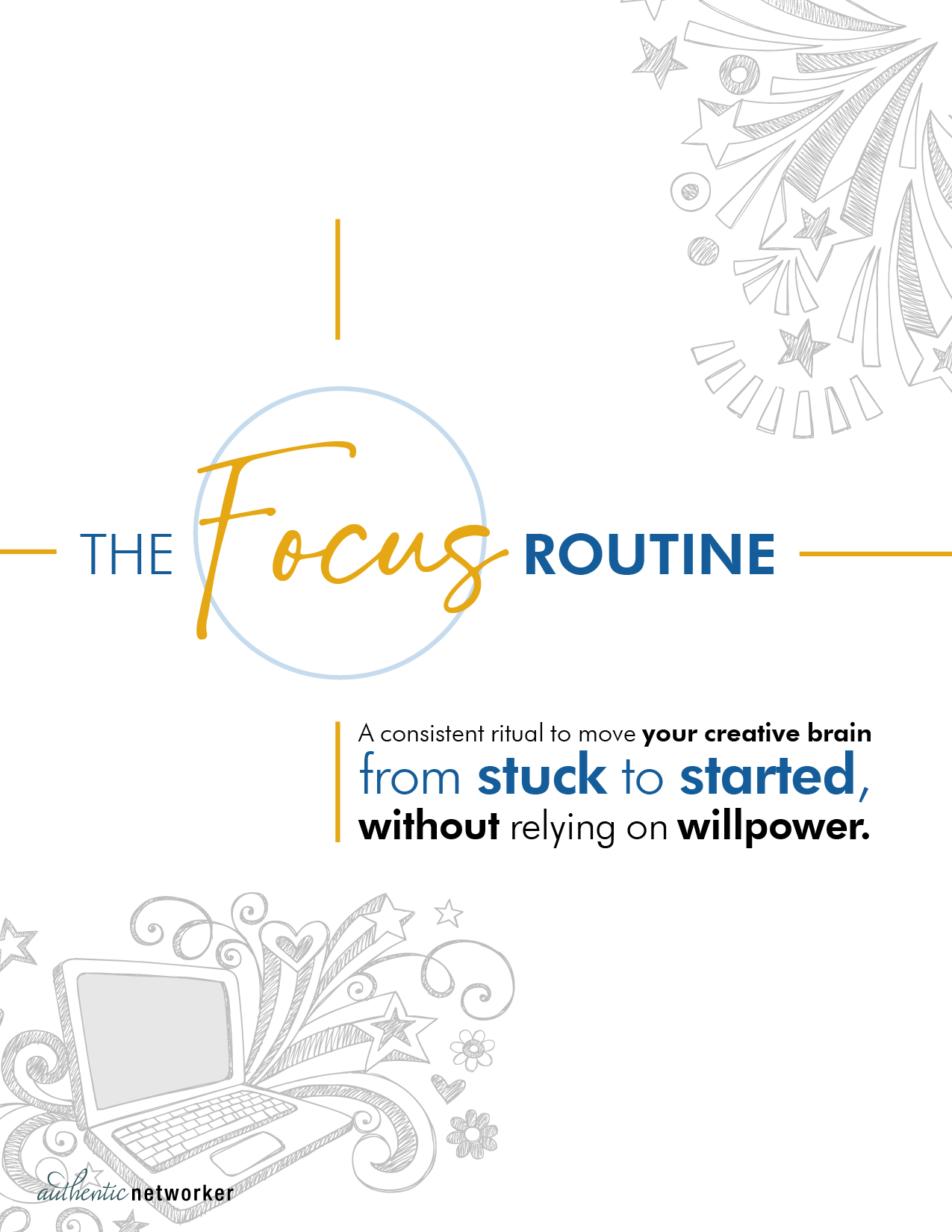The Rebel's Guide to Getting Things Done: When Your Brain Revolts


You know that thing where you want to do something… until someone tells you to do it?
Suddenly your brain is on strike, your to-do list is the enemy, and you’re questioning every life choice.
You know that thing where you want to do something… until someone tells you to do it?
Suddenly your brain is on strike, your to-do list is the enemy, and you’re questioning every life choice.
In this episode of Transition Space , Mia gets honest about what happens when motivation meets resistance. She shares what changed once she stopped trying to force productivity—and started understanding how her brain actually works. From childhood rebellion to the Four Tendencies to some wild identity-based motivation science, this one’s for the rebels, the avoiders, and anyone who needs a gentler (but sneakily powerful) way to get things done.
----------------------
The Focus Routine
If your to-do list feels like a dare, not a plan…
✨ The Focus Routine was made for you. A free, downloadable momentum-friendly ritual that fits your rebel wiring.
👉 authenticnetworker.com/focusroutine
----------------------
🧠 Wavelength
Need more help to get your work done consistently?
Join a whole bunch of weird people, showing up to do our work together so we don't end up spending the whole day watching cat videos.
✨ Wavelength is a coworking community for neurodivergent solopreneurs who thrive with structure that doesn’t suffocate.
👉 authenticnetworker.com/wavelength
----------------------
💬 Citations, you say? I've got you.
🧭 Four Tendencies (a.k.a. Why You Hate Being Told What to Do)
Rubin, G. (2017). The Four Tendencies: The Indispensable Personality Profiles That Reveal How to Make Your Life Better (and Other People's Lives Better, Too) . Harmony Books.
👉 Take the quiz — it takes 5 minutes and may explain your entire life.
🧬 Identity-Based Motivation (Your Brain on “Should”)
Oyserman, D., & James, L. (2011). “Possible identities.” In Handbook of Identity Theory and Research (pp. 117–145). Springer.
🧠 Research takeaway: You’re 45% more likely to stick with a goal if it feels like something someone like you would do.
🌀 ADHD & Pathological Demand Avoidance (The Struggle Is Neurological)
Newson, E., Le Maréchal, K., & David, C. (2003). “Pathological demand avoidance syndrome: a necessary distinction within the pervasive developmental disorders.” Archives of Disease in Childhood , 88(7), 595–600.
📚 For anyone who’s ever whispered “Don’t tell me what to do” to their own to-do list.
----------------------
Episode keywords: ADHD productivity, rebel tendency, Gretchen Rubin Four Tendencies, pathological demand avoidance, PDA, identity-based motivation, creative resistance, neurodivergent focus, procrastination, how to stop procrastinating, productivity for rebels, motivation strategies for ADHD, how to get things done with ADHD, working with resistance, emotional productivity, solopreneur mindset, executive dysfunction, dopamine-driven focus, productivity mindset, rebel workflow, authenticity in work, identity and behavior, body doubling strategies, gentle accountability, resistance to expectations, coworking, focus routine
Mia: Ever notice how the moment someone expects something from you, your whole body decides that's exactly what you won't be doing today? Today I'm sharing what I learned about resisting expectations, why identity matters more than willpower, and how to make progress on your own terms.
3, 2, 1. Let's go. Welcome to Transition Space, your gateway from thinking to doing. I'm Mia Torr. If you're called to create meaningful work, use this podcast as part of your starting ritual. Make your coffee and clear your desk while you listen, and we'll hang out as you ease into focused flow. While you create your space, I'll help you entertain the transition. Come on in.
Today on Transition Space, a story about rebellion, resistance, and how to get things done when you're wired differently.
I have a complicated relationship with expectations. Actually, that's not quite right. I have a very simple relationship with expectations. I. I see them and I run the other way.
Picture this. I'm eight years old. I'm about to clean my room. The motivation is humming. The energy is perfect. I'm actually excited about creating an organized space for a change. Then my mom walks by and she says, don't forget to clean your room. And suddenly every cell in my body rebels. The task that was my choice moments ago now feels like a prison sentence. Well, I am not doing it now.
For me, this sentiment extends to all areas of productivity. Those beautiful morning routines everyone swears by? For me, they turn into handcuffs the moment they become expectations. Those artfully crafted to do lists? They become monuments to everything I refuse to do today. And don't get me started on what happens when someone tells me to do something that's already on my list. I will complete it in record time, muttering under my breath the entire way about how I was going to do it anyway. And they didn't have to tell me.
That eight-year-old girl grew up trying so hard to find the motivation to get things done and failing spectacularly. I'd see other people conscientiously checking things off their to do lists while I struggled with a dramatic and immediate system override to any expectations.
Looking back, it makes perfect sense. What I didn't learn until adulthood was that I had undiagnosed ADHD and pathological demand avoidance. For me, this meant a built-in resistance to expectations. Every should triggered an automatic nope. Every external demand felt like a threat to my autonomy.
But over time, I noticed a pattern. Every time I actually did succeed at something big, it wasn't because I followed the rules. It was because I broke them in exactly the right way.
When I stopped trying to be good and started being effective, when I treated tasks as my choice and did them my way instead of someone else's, I was better able to get things done.
And then one day I happened to take Gretchen Rubin's Four Tendencies quiz. If this is something you haven't done, go do it. It only takes five minutes. It will blow your mind. I'll put the link in the show notes for you.
This tiny but mighty quiz reveals how we respond to expectations and get things done. Do we complete tasks because outside forces are pushing us or because our inner motivation directs us?
Gretchen Rubin explains there are four kinds of people. There are Upholders, who respond to both internal and external expectations. These are the people who follow rules, finish their homework on time, and keep their New Year's resolutions. Then there are Questioners, who have strong internal expectations, but they are wary of any expectations that come from outside. If you tell them to do something, they won't buy it unless it matches their inner values. Most people are Obligers, who have weaker internal expectations, but they will work hard to meet external deadlines or other people's expectations.
As for me, it turns out I'm the fourth kind of person. A Rebel. Rebels are the fun ones who resist all expectations. If I'm counting on myself to do it, I won't do it. If someone else is counting on me to do it, I also won't do it. This makes me a pain in the ***.
What I've learned is that rebels are motivated by the big picture and by our identity. We don't want to be forced to complete a task, but if we can line up that task with who we believe we are as people, the resistance level drops.
Your brain is allergic to shoulds.
That's basically what researchers Daphne Ouserman and Leah James uncovered when they studied what makes people actually follow through on their goals. Their takeaway identity matters more than willpower. If a goal feels like something you should do, your brain resists. But it feels like something you would do, something that fits who you are. You're far more likely to stick with it, not because you suddenly became more disciplined, but because it stops feeling like effort. You're not pushing. You're just doing what someone like you does.
It's the behavioral equivalent of slipping into jeans that actually fit. It's the difference between being told to clean your room and choosing to create a space that reflects who you are. Between forcing yourself to network and being someone who builds meaningful connections. Between dragging yourself to the gym and being someone who takes care of their body.
Armed with this knowledge, I started deliberately motivating myself differently. Instead of fighting my resistance when I had something to do, I began by leaning into my identity. Now, I don't run because a training plan tells me to. I run because I am the kind of person who loves challenging myself to grow stronger. I didn't write this podcast episode because it was on my to do list. I wrote it. And I'm here because I'm the kind of person who chooses to do hard things even when I don't feel like it, because I know the world is a better place when I contribute meaningfully.
This is what worked for me, understanding my own wiring and learning to work with it instead of against it. Your path might look different, but the principle of working with your natural tendencies rather than fighting them? That's universal.
The next time you brush up against something you should do, try letting your identity guide you toward action that feels like it's your choice.
Whether you're making coffee or arranging your desk right now, ask yourself, who am I at my core and what bigger purpose drives me? Let those answers guide your next action.
I'd love to hear how you work with your own resistance and wiring. Visit authenticnetworker.com/transitionspace and share what identity moves you into action.
This is Transition Space, where you clear your path from thinking to doing. I'm Mia, and together we've shaped what's possible. Now it's your turn to make it real.



